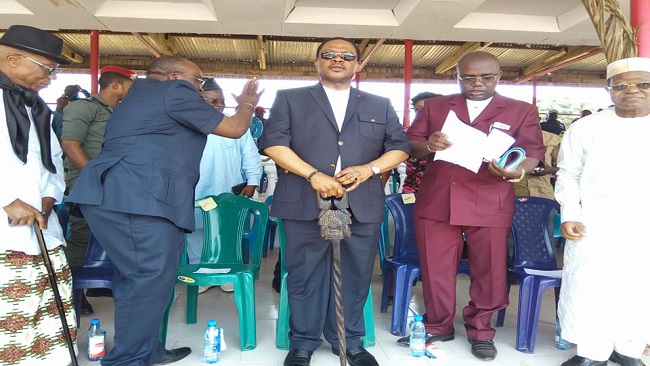Categories
Recent Posts
- Football: Dembele goal gives PSG narrow advantage over Arsenal in Champions League
- US: Trump addressing rally in Michigan as he marks 100 days in office
- Vatican: Conclave to elect new pope will start on May 7
- Namibian minister sacked after being accused of rape
- Dozens of African migrants killed in US strike on Yemen
Archives
- April 2025
- March 2025
- February 2025
- January 2025
- December 2024
- November 2024
- October 2024
- September 2024
- August 2024
- July 2024
- June 2024
- May 2024
- April 2024
- March 2024
- February 2024
- January 2024
- December 2023
- November 2023
- October 2023
- September 2023
- August 2023
- July 2023
- June 2023
- May 2023
- April 2023
- March 2023
- February 2023
- January 2023
- December 2022
- November 2022
- October 2022
- September 2022
- August 2022
- July 2022
- June 2022
- May 2022
- April 2022
- March 2022
- February 2022
- January 2022
- December 2021
- November 2021
- October 2021
- September 2021
- August 2021
- July 2021
- June 2021
- May 2021
- April 2021
- March 2021
- February 2021
- January 2021
- December 2020
- November 2020
- October 2020
- September 2020
- August 2020
- July 2020
- June 2020
- May 2020
- April 2020
- March 2020
- February 2020
- January 2020
- December 2019
- November 2019
- October 2019
- September 2019
- August 2019
- July 2019
- June 2019
- May 2019
- April 2019
- March 2019
- February 2019
- January 2019
- December 2018
- November 2018
- October 2018
- September 2018
- August 2018
- July 2018
- June 2018
- May 2018
- April 2018
- March 2018
- February 2018
- January 2018
- December 2017
- November 2017
- October 2017
- September 2017
- August 2017
- July 2017
- June 2017
- May 2017
- April 2017
- March 2017
- February 2017
- January 2017
- December 2016
- November 2016
- October 2016
- September 2016
- August 2016
- July 2016
- June 2016
Featured
Most Commented Posts
 4 Anglophone detainees killed in Yaounde
4 Anglophone detainees killed in Yaounde
18 comments Chantal Biya says she will return to Cameroon if General Ivo Yenwo, Martin Belinga Eboutou and Ferdinand Ngoh Ngoh are sacked
Chantal Biya says she will return to Cameroon if General Ivo Yenwo, Martin Belinga Eboutou and Ferdinand Ngoh Ngoh are sacked
13 comments The Anglophone Problem – When Facts don’t Lie
The Anglophone Problem – When Facts don’t Lie
12 comments Anglophone Nationalism: Barrister Eyambe says “hidden plans are at work”
Anglophone Nationalism: Barrister Eyambe says “hidden plans are at work”
12 comments Largest wave of arrest by BIR in Bamenda
Largest wave of arrest by BIR in Bamenda
10 comments
Latest Tweets
Featured
-

Football: Dembele goal gives PSG narrow advantage over Arsenal in Champions League
-

US: Trump addressing rally in Michigan as he marks 100 days in office
-

Vatican: Conclave to elect new pope will start on May 7
-

Namibian minister sacked after being accused of rape
-

Dozens of African migrants killed in US strike on Yemen
-

Manyu Division: A new path is possible
-

Who will be the next pope? Key candidates in an unpredictable process
© Cameroon Concord News 2025





29, July 2024
Cocoa & Forests Initiative stakeholders gather in Abidjan to combat deforestation 0
Stakeholders of the cocoa and forest initiative stakeholders recently met in the Ivorian capital, Abidjan, to come up with strategies to combat deforestation in cocoa production and drive forest restoration through collective efforts.
The seventh meeting of the Cocoa and Forests Initiative (CFI) Steering Committee, led by the Ivorian Minister of Water and Forests, brought together key stakeholders from the signatories to key observers, to review the initiative’s progress and outline crucial steps for sustainable cocoa production in Côte d’Ivoire.
Key Highlights of the meeting included the approval of a diagnostic study on CFI’s operations and governance to clarify stakeholder roles and improve governance effectiveness; contributions towards the development of a national deforestation monitoring system led by the country’s Prime Minister’s Office, leveraging satellite tools to enhance deforestation mitigation; directives to formalise a memorandum of understanding for a collective project within the CFI landscape, prioritising the Yapo-Abbé and Bossématié forests.
The Ivorian Minister of Water and Forests underscored the importance of continued dialogue and collective actions among cocoa and forestry stakeholders. With over EUR 1 million invested in the past three years to support the CFI secretariat, IDH remains committed to providing financial and technical support to ensure the success of landscape projects to be developed and the execution of CFI’s priority actions.
It should be stressed that the power of the Cocoa & Forests Initiative (CFI) is that it brings together crucial stakeholders from both the private and public sectors to address the systemic challenge of deforestation linked to cocoa and the restoration of degraded forests.That power was on full display in late June when CFI’s Côte d’Ivoire steering committee met in Abidjan. Chaired and hosted by Côte d’Ivoire’s Minister for Water and Forests, the event convened representatives from several key government institutions and CFI signatory companies.
The event brought together more than 40 participants, including Hannah Ward who recently joined WCF as Director of Environment. After attending the event, she reflected on the striking nature of just how many stakeholders were at the table.
“It was impressive to see the engagement and ownership of everyone involved, with recognition on all sides that we are at an inflection point where we must accelerate collective action to drive implementation at a much greater scale and achieve CFI’s core objectives,” she said.
Accelerating impact through landscapes
CFI is making a strong impact in Côte d’Ivoire’s cocoa sector, with signatory companies investing USD 197 million from 2021 to 2023 on projects in the country that support CFI’s objectives. In 2023, this provided 600,000 Ivorian farmers with technical assistance and support to increase theadoption of sustainable practices while also helping them develop 114,000 hectares of cocoa agroforestry, among other outcomes.
In addition to celebrating this progress, the steering committee meeting keyed in on CFI’s landscape approach based on collective action and co-investment. Work has begun in the priority landscapes of Yapo-Abbé and Bossématié, including the launch of comprehensive land-use assessments, stakeholder engagement and baseline studies. These will be finalised by the end of 2024.
At the meeting, attendees discussed what will be needed to accelerate progress with these two landscapes.
“The real source of excitement among stakeholders at the committee meeting was around progress on collective action in these landscapes,” Ward said.
Another important topic of discussion was how the private and public sectors can work together to develop a regulatory framework for carbon that’s fit for purpose and that spurs greater private sector investment in forest protection and other environmental outcomes. WCF is currently working with Quantis to develop a comprehensive GHG accounting methodology that members can use.
Overall, WCF and signatory companies made it clear that they are as focused as ever on CFI and its objectives. This was perhaps best summed up by WCF President Chris Vincent during his remarks.
“The results we have seen are very encouraging. However, to achieve the impact we aim for, we must go much further,” Vincent said. “WCF and its members remain deeply committed to the goals of CFI. As we move forward into its second phase, we must redouble our efforts and collaboration.”
By Cecilia M. Manjang